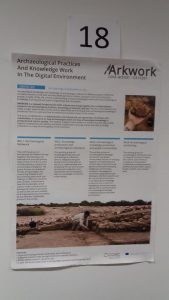

- This event has passed.
ARKWORK @ DHN 2018 in Helsinki
9th March 2018
 COST-ARKWORK participates in the poster session of the Digital Humanities Nordic 2018 conference in Helsinki, Finland.
COST-ARKWORK participates in the poster session of the Digital Humanities Nordic 2018 conference in Helsinki, Finland.
ARKWORK: Archaeological practices and knowledge in the digital environment
1Uppsala University,; 2University of Helsinki; 3University of Toronto; 4Vilnius University; 5University of Glasgow; 6University of Venice; 7Umeå University; 8University of Copenhagen; 9Independent researcher; [email protected]
Archaeology and material cultural heritage have often enjoyed a particular status as a form of heritage that has captured the public imagination. As researchers from many backgrounds have discussed, it has become the locus for the expression and negotiation of European, local, regional, national and intra-national cultural identities, for public policy regarding the preservation and management of cultural resources, and for societal value in the context of education, tourism, leisure and well-being. The material presence of objects and structures in European cities and landscapes, the range of archaeological collections in museums around the world, the monumentality of the major archaeological sites, and the popular and non-professional interest in the material past are only a few of the reasons why archaeology has become a linchpin in the discussions on how emerging digital technologies and digitization can be leveraged for societal benefit. However, at the time when nations and the European community are making considerable investments in creating technologies, infrastructures and standards for digitization, preservation and dissemination of archaeological knowledge, critical understanding of the means and practices of knowledge production in and about archaeology from complementary disciplinary perspectives and across European countries remains fragmentary, and in urgent need of concertation.
In contrast to the rapid development of digital infrastructures and tools for archaeological work, relatively little is known about how digital information, tools and infrastructures are used by archaeologists and other users and producers of archaeological information such as archaeological and museum volunteers, avocational hobbyists, and others. Digital technologies (infrastructures, methods and resources) are reconfiguring aspects of archaeology across and beyond the lifecycle (i.e., also “in the wild”), from archaeological data capture in fieldwork to scholarly publication and community access/entanglement.Both archaeologists and researchers in other fields, from disciplines such as museum studies, ethnology, anthropology, information studies and science and technology studies have conducted research on the topic but so far, their efforts have tended to be somewhat fragmented and anecdotal. This is surprising, as the need of better understanding of archaeological practices and knowledge work has been identified for many years as a major impediment to realizing the potential of infrastructural and tools-related developments in archaeology. The shifts in archaeological practice, and in how digital technology is used for archaeological purposes, calls for a radically transdisciplinary (if not interdisciplinary) approach that brings together perspectives from reflexive, theoretically and methodologically-aware archaeology, information research, and sociological, anthropological and organizational studies of practice.
This poster presents the COST Action “Archaeological practices and knowledge work in the digital environment” (http://www.cost.eu/COST_Actions/ca/CA15201 – ARKWORK), an EU-funded network which brings together researchers, practitioners, and research projects studying archaeological practices, knowledge production and use, social impact and industrial potential of archaeological knowledge to present and highlight the on-going work on the topic around Europe.
ARKWORK (https://arkwork.eu/) consists of four Working Groups (WGs), with a common objective to discuss and practice the possibilities for applying the understanding of archaeological knowledge production to tackle on-going societal challenges and the development of appropriate management/leadership structures for archaeological heritage. The individual WGs have the following specific but complementary themes and objectives:
WG1 – Archaeological fieldwork
Objectives: To bring together and develop the international transdisciplinary state-of-the-art of the current multidisciplinary research on archaeological fieldwork. How archaeologists are conducting fieldwork and documenting their work and findings in different countries and contexts and how this knowledge can be used to make contributions to developing fieldwork practices and the use and usability of archaeological documentation by the different stakeholder groups in the society.
WG2 – Knowledge production and archaeological collections
Objectives: To integrate and push forward the current state-of-the-art in understanding and facilitating the use and curation of (museum) collections and repositories of archaeological data for knowledge production in the society.
WG3 – Archaeological knowledge production and global communities
Objectives: To bring together and develop the current state-of-the-art on the global communities (including indigenous communities, amateurs, neo-paganism movement, geographical and ideological identity networks and etc.) as producers and users in archaeological knowledge production e.g. in terms of highlighting community needs, approaches to communication of archaeological heritage, crowdsourcing and volunteer participation.
WG4 – Archaeological scholarship
Objectives: To integrate and push forward the current state-of-the-art in study of archaeological scholarship including academic, professional and citizen science based scientific and scholarly work.
In our poster we outline each of the working groups and provide a clear overview of the purposes and aspirations of the COST Action Network ARKWORK